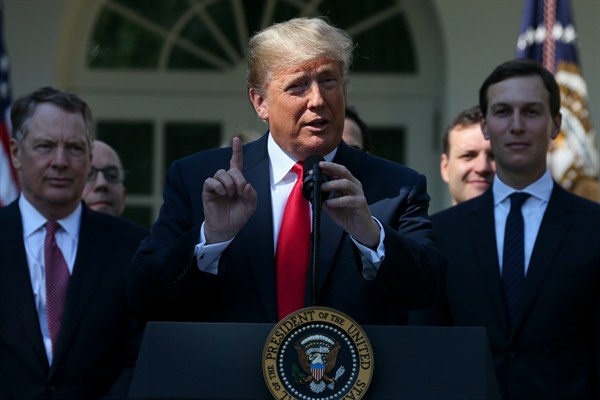Besides getting Mexico to pay for the wall, which continues to elude him, there were two things that U.S. President Donald Trump seemed to want most out of the renegotiation of the North American Free Trade Agreement. One was increased access to the Canadian market for American dairy farmers, and the other was an incentive to increase car production in the United States. He won on those things, though the latter could well turn out to be a pyrrhic victory. But he is undercutting any credit he might get for those victories with his fondness for tariffs. Indeed, if looking tough for his political base continues to eclipse all else, the president could lose the chance to replace the NAFTA he hates with the one he says he loves, at least for now.
In trying to unravel the mystery of what Trump really wants to achieve with his trade tactics, the NAFTA case deserves a closer look. When Trump initially declined to exempt Canada and Mexico from the tariffs on steel and aluminum, imposed on supposed national security grounds, most observers assumed he was using them as leverage to get a better deal in the NAFTA renegotiation. But the new deal—rebranded as the U.S.-Mexico-Canada Agreement, or USMCA—was signed in Buenos Aires on Nov. 30 and, so far at least, the tariffs remain in place. So too do the retaliatory tariffs that Canada and Mexico imposed on carefully chosen American exports.
Dairy farmers in Wisconsin, the home state of outgoing Speaker of the House Paul Ryan, were among those that found themselves in the crosshairs. Under NAFTA originally, Mexico removed its barriers to agricultural imports from the United States. By 2017, it was buying a quarter of all U.S. dairy exports. When the Trump administration imposed the tariffs on steel and aluminum, Mexico retaliated with 25 percent tariffs on American cheese. Canada, in turn, targeted yogurt and chocolate. The president of the trade group representing the American dairy industry welcomed conclusion of the USMCA given the increased access it will provide to the Canadian market. But he noted that the benefits would be offset as long as the retaliatory tariffs on its exports in North America remain in place.

